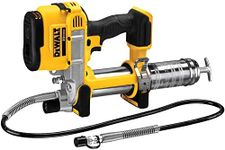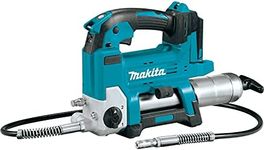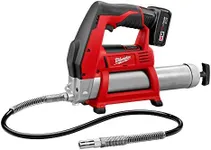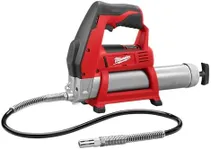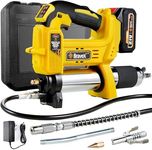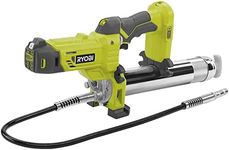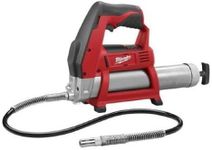Buying Guide for the Best Cordless Grease Guns
Choosing the right cordless grease gun can make maintenance tasks much easier and more efficient, especially if you regularly work with vehicles, machinery, or equipment that requires lubrication. The key is to match the tool’s capabilities to your specific needs, considering how often you’ll use it, the types of fittings you’ll encounter, and the environments in which you’ll be working. Understanding the main features will help you select a grease gun that’s comfortable, reliable, and effective for your tasks.Battery Voltage and CapacityBattery voltage and capacity determine how powerful the grease gun is and how long it can operate before needing a recharge. Higher voltage batteries (like 18V or 20V) generally provide more power and longer run times, which is useful for heavy-duty or frequent use. Lower voltage options (such as 12V) are lighter and may be sufficient for occasional or lighter tasks. If you plan to use the grease gun for extended periods or on tough fittings, a higher voltage and larger capacity battery will be beneficial. For lighter, infrequent jobs, a lower voltage model may be more comfortable and cost-effective.
Grease Delivery PressureGrease delivery pressure, usually measured in PSI (pounds per square inch), indicates how forcefully the grease is pushed out. Higher pressure is important for clearing clogged fittings or working with equipment that requires grease to be delivered under force. Typical ranges are from 3,000 PSI for light-duty up to 10,000 PSI for heavy-duty models. If you mostly work with standard fittings, moderate pressure is sufficient. For stubborn or high-resistance fittings, opt for a model with higher maximum pressure.
Grease Flow RateThe flow rate, often measured in ounces per minute, tells you how quickly the grease is dispensed. A higher flow rate means you can lubricate more fittings in less time, which is helpful for large jobs or professional use. Lower flow rates offer more control and are suitable for precision work or smaller tasks. Consider how many fittings you typically need to grease at once—if it’s a lot, a higher flow rate will save time; for occasional or detailed work, a lower rate is fine.
Hose LengthHose length affects how easily you can reach awkward or tight spots. Longer hoses (over 36 inches) are great for accessing hard-to-reach fittings without moving the tool too much, while shorter hoses (around 18-24 inches) are easier to manage and store. If you often work on large machinery or in confined spaces, a longer hose will be more convenient. For bench work or easily accessible fittings, a shorter hose is usually sufficient.
Cartridge CapacityCartridge capacity refers to how much grease the gun can hold at one time, usually measured in ounces or by standard cartridge size. Larger capacities mean fewer reloads, which is helpful for big jobs or frequent use. Smaller capacities make the tool lighter and easier to handle, which is good for occasional or light-duty tasks. Think about how much greasing you do in one session—if it’s a lot, a larger capacity will be more efficient.
Weight and ErgonomicsThe weight and design of the grease gun affect how comfortable it is to use, especially over long periods. Lighter models are easier to handle and reduce fatigue, while heavier models may offer more durability or features. Ergonomic grips and balanced designs make the tool more comfortable and safer to use. If you’ll be using the grease gun frequently or for extended periods, prioritize comfort and ergonomics. For occasional use, weight may be less of a concern.
